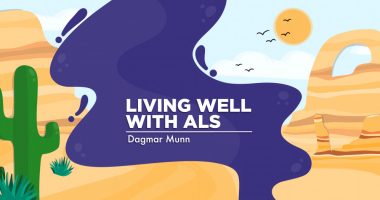Cannabis and ALS
Last updated March 4, 2024, by Susie Strachan

For people who have amyotrophic lateral sclerosis (ALS) — a neurodegenerative disease that damages neurons in the brain and spinal cord — cannabis can help ease certain symptoms, including pain, depression, loss of appetite, and muscle spasms.
The cannabis plant has been used for medical and recreational purposes for thousands of years. It contains more than 100 active compounds called cannabinoids, of which tetrahydrocannabinol (THC) and cannabidiol (CBD) are the most well known.
These two compounds have shown promise at easing some ALS symptoms, when used alone or in combination.
Potential benefits of cannabis in ALS
Medical cannabis, also known as medical marijuana, is considered an ALS alternative therapy, and is being studied as a potential treatment for symptoms in other neurodegenerative diseases such as multiple sclerosis, Alzheimer’s disease, and Parkinson’s disease.
Several therapies are approved to help slow disease progression in ALS patients, but none can reverse neuronal damage after it has occurred.
For most people with ALS, symptoms will continue to worsen gradually over time, potentially requiring additional ALS therapies, as well as nondrug interventions such as physiotherapy, occupational therapy, and speech therapy.
A small number of clinical studies has looked at the use of medical cannabis, or medical marijuana, in people living with ALS. Researchers have found that those using cannabis generally experienced moderate relief in depression, appetite loss, spasticity (muscle cramps and stiffness), pain, and drooling.
Before trying cannabis, speak with a healthcare professional who specializes in treating ALS. Its compounds may interact with ALS medications or cause other side effects. Some products may be more effective for certain symptoms than others, so getting the appropriate guidance is important.
Pain relief
People with ALS commonly experience pain that can stem from extra strain on their muscles and joints, the inability to change positions, muscle spasms and twitches (fasciculations), or medical procedures.
A number of strategies can help manage pain due to ALS, including some antidepressants and anti-anxiety medications, and opioids such as morphine. Cannabis pain relief has been studied as a potential alternative to these medications.
Cannabis products, which may contain cannabinoids taken from the plant or lab-made cannabinoids, have been studied for chronic pain relief in a number of conditions.
Findings have generally suggested some products, when taken as a CBD and THC mouth spray or sublingually (dissolved under the tongue), have the potential to offer short-term relief, but they may also increase the risk of dizziness and sleepiness.
There is also concern about how cannabis may affect older people, in whom ALS is most commonly diagnosed.
Muscle spasticity
So far, few studies have been conducted on cannabis treatment for ALS spasticity, a symptom involving muscle stiffness and tightness which is experienced by about one-third of people with ALS.
However, cannabis-based products have been widely investigated to manage spasticity in MS and have reportedly helped many patients.
Nabiximols, an oral spray containing both THC and CBD that’s sold as Sativex, is approved in many countries worldwide — though not in the U.S. — for treating spasticity in MS patients. Many other cannabis products have also proven helpful for muscle spasticity and other symptoms of MS.
In ALS, a clinical trial found six weeks of treatment with nabiximols eased spasticity in patients. Spasticity worsened among those who were given a placebo.
A small study in Germany also showed a combination of THC and CBD resulted in a high level of satisfaction among people with ALS who had mild to severe muscle spasticity. The vast majority of participants were very satisfied with the treatment’s convenience and its effect on spasticity.
Studies in MS may suggest cannabis could also help with spasticity in people with ALS, but more research is needed to confirm these potential benefits, including comparing cannabis treatment with certain therapies commonly used for ALS spasticity.
Bladder problems
Spasticity in the muscles that control the bladder can sometimes lead to urinary problems in ALS.
Sativex has been studied in MS patients with urinary problems with some positive results, particularly in those with an overactive bladder.
However, no studies have examined Sativex or other cannabis-based products for urinary symptoms in ALS.
Mental health
People with ALS have reported cannabis products have helped boost their mental health.
CBD is the main non-psychoactive component found in cannabis. It does not cause a high, but has a range of other effects, including helping to relieve anxiety.
Many CBD products, including oils, gummies, and vape liquids, are used as a self-treatment for mental health issues such as anxiety, post-traumatic stress disorder, and depression. Some evidence has shown CBD has a positive effect on these conditions.
However, using cannabis, especially frequently, has been linked to disorientation, unpleasant thoughts, and feelings of anxiety and paranoia. Developing other mental illnesses is a potential risk, particular for younger people who use it regularly.
CBD products are not well regulated in the U.S. and many don’t contain what is listed on their labels, according to laboratory tests. Caution is advised for anyone considering the use of CBD.
Other benefits
Cannabis may be able to help relieve insomnia, nausea, and vomiting, and increase appetite. A survey involving ALS patients showed cannabis may help ease drooling and appetite loss, but more research is needed.
How cannabis works
The active ingredients in cannabis are called cannabinoids. Some of these compounds are believed to work as antioxidants. They also have anti-inflammatory and neuroprotective properties, which may help counteract some symptoms caused by nerve damage in ALS.
THC is the main psychoactive cannabinoid in the cannabis plant. It produces the high that’s commonly associated with the recreational use of cannabis, but it can also help to reduce pain and nausea, and increase appetite.
Some synthetic THC formulations have been approved in the U.S., though none specifically for ALS or its symptoms. Other products containing THC are not legal federally in the U.S., but some states have legalized them for medical and recreational use.
CBD is the other main cannabinoid in cannabis. The amount of CBD and THC in cannabis varies greatly.
Both THC and CBD interact with the body’s system that is responsible for regulating many critical functions, including memory and learning, sleep, pain sensation, mood, and immune responses.
Because CBD and THC work differently, anyone with ALS who is considering medical cannabis to alleviate some of their symptoms should first consult with their doctor.
Cannabis treatment options for ALS
In the U.S., CBD is available as drops, capsules, syrups, food products such as chocolate bars and gummies, topical lotions and creams, and cosmetics.
Because cannabis is not approved by the U.S. Food and Drug Administration, it is not available in pharmacies, nor is it covered by insurance companies.
Inhaled products
Cannabis is most commonly smoked, although it’s also inhaled by vaping or dabbing, or with a water pipe (bong).
Smoking or vaping cannabis is not recommended for people with ALS, who may have breathing difficulties that could be worsened by inhaling smoke.
Edibles
Cannabis, and particularly CBD products, are available in many edible forms such as gummies, chocolates, cookies, ice cream, drinks, and other food products.
For edibles to be sold legally in the U.S., they cannot contain more than 0.3% THC. Edibles generally take longer to have an effect than inhaled cannabis products.
Oral sprays
CBD-based products are available as an oral spray. They can be applied inside the cheek, under the tongue, into the nose, or on the skin.
Most sprays are made by mixing an oil such as coconut oil or hemp seed oil with CBD extract. Similar to edibles, CBD spray products cannot contain more than 0.3% of THC.
Risks of cannabis use in ALS
Self-medicating with cannabis carries risks, especially when taking unregulated products. There’s also risk with its potential interactions with ALS medications and when its use is unsupervised by a medical professional.
Studies have shown cannabis can cause adverse reactions, including respiratory problems, along with psychiatric and cardiovascular problems.
Smoking or vaping cannabis can irritate the lungs, potentially causing lung infections, bronchitis (airway inflammation), long-term cough, increased mucus buildup, and other breathing difficulties. The smoke contains harmful chemicals that can be carcinogenic.
Cannabis use has been linked to psychosis, paranoia, anxiety, and disorientation, as well as abnormal heart rhythms. Long-term use can lead to problems with memory and concentration.
Legal status
In the U.S, individual states have different rules about legalization, decriminalization, recreational and medical use, allowed concentrations of CBD and THC in products, and limits on personal possession.
Rules about cannabis use are also different internationally. To date, countries where using cannabis is legal, with varying conditions, include Canada, Mexico, Thailand, and Uruguay.
Many countries continue to make cannabis illegal, while others have approved its use for medical purposes, or have decriminalized possession but have not approved the sale of cannabis for nonmedical use.
ALS News Today is strictly a news and information website about the disease. It does not provide medical advice, diagnosis, or treatment. This content is not intended to be a substitute for professional medical advice, diagnosis, or treatment. Always seek the advice of your physician or other qualified health provider with any questions you may have regarding a medical condition. Never disregard professional medical advice or delay in seeking it because of something you have read on this website.
Recent Posts
- Lessons for living with ALS from my recent nature walk
- Extended treatment with NurOwn may offer additional benefits in ALS
- Protein interaction may lead to new strategy for treatment of ALS
- These bathroom safety modifications were a great decision
- NeuroSense taps machine learning to optimize PrimeC Phase 3 testing
Related articles






